This piece is part of a series titled “Nonstate armed actors and illicit economies in 2023” from Brookings’s Initiative on Nonstate Armed Actors.
Since the appointment of Prime Minister Mohammed Shia al-Sudani in October 2022, Iraq’s Popular Mobilization Forces (PMF), an umbrella organization of mostly Shiite militia groups that is accorded a formal status as an auxiliary branch of the Iraqi security forces, is making a comeback. Despite many challenges and serious setbacks since 2018, the PMF has shown a marked ability to bounce back from weakened leadership and internal fractures, a significant electoral defeat, and the loss of political capital with large segments of the Iraqi public. It has survived pressures resulting from the January 2020 U.S. assassinations of its former commander, Abu Mahdi al-Muhandis, and his Iranian sponsor, Qassem Soleimani, the former head of the Islamic Revolutionary Guard Corps (IRGC) Quds Force, and from measures undertaken by the former prime minister, Mustafa al-Kadhimi. Not only has the PMF proved resilient, but it also retains political and military advantages that are likely to make it a force to be reckoned with for decades to come.
Yet the PMF also faces challenges, and its malign activities, which include human rights abuses, may yet be curtailed, especially if the West and its regional allies can work with moderate actors in Iraq or those that fear the organization’s monopolization of power. The most significant of the PMF’s difficulties comes in the form of Iraq’s intra-Shiite political rivalries. Both the PMF’s power and vulnerabilities were manifest last August when Iraq was pushed to the brink of civil war following political tensions and violent confrontations between the PMF and its political allies, known as the Shiite Coordination Framework, and their rival, Muqtada al-Sadr. Sadr heads Iraq’s most powerful sociopolitical movement, the Sadrist movement, and one of the country’s most powerful militia groups, Saraya al-Salam. Although his withdrawal from politics is likely temporary, Sadr will remain a significant challenge for the PMF in future religious leadership succession contests, economic turf battles, and day-to-day politicking. This intra-Shiite contestation as well as external pressures will not only threaten the PMF but can also reignite more violence, even another civil war.
The Rise and Weakening of the PMF
Since the 2003 U.S. invasion of Iraq, Shiite militia groups have enjoyed dramatic success in expanding their influence, augmenting their combat capabilities, and transitioning from rag-tag militia groups to powerful political players with considerable control over the Iraqi state. Some, like the Badr Brigade, established in the 1980s during the Iran-Iraq War, were already firmly entrenched political actors with a loyal support base. Others, like Asaib Ahl al-Haq and Kataib Hezbollah, designated as terrorist groups by the United States, drew on their battlefield successes against the Islamic State (ISIS) between 2014 and 2018 to evolve into major political players.
Iraq’s Shiite militia network is underpinned by an array of informal sociopolitical, cultural, and security structures. Some emerged in the post-invasion tumult, others developed during the years of Baathist rule. The 1980-88 Iran-Iraq War forged friendships, kinships, and revolutionary camaraderie among the main factions and their leaders.
The network is also undergirded by Iran. As head of the PMF and Kataib Hezbollah and Soleimani’s right-hand man, Muhandis had played a critical role in enhancing Iran’s influence over the Iraqi political system. As a result, Iran had been able to outsource some of its local security requirements to Muhandis in recent years, just as it had done with Badr Brigade leader Hadi al-Amiri during the 1990s and after the U.S. invasion in 2003.
In Iraq’s 2018 parliamentary elections, the political parties linked to the PMF came in second. That impressive outcome solidified the PMF’s status as a formidable political actor. But the January 2020 assassinations of Muhandis and Soleimani widened internal fractures. The PMF’s new leadership has lacked their authority and strategic acumen. Instead, key PMF groups such as the Badr Brigade and Asaib Ahl al-Haq have pivoted toward Nouri al-Maliki of the Islamic Dawa Party, whose tenure as prime minister (2006-14) hastened the PMF’s ascension.
Moreover, in March 2020, several PMF factions aligned with Iraq’s Ayatollah Ali al-Sistani withdrew from the PMF and placed themselves directly under the authority of the Iraqi Armed Forces. These militia groups had previously resisted Iran’s influence but operated within the ambit of the PMF during the war against ISIS. This split significantly weakened the PMF, which had drawn significant religious legitimacy and political influence under the cover of Iraqi nationalism and patriotism from al-Sistani’s blessing in 2014. However, the PMF’s legitimacy had already been undermined by its actions in 2018, when its Iran-backed factions systematically repressed civilians during the Tishreen protests, which challenged Iraq’s ruling elite and its misgovernance as well as Iran’s influence in the country.
This cumulative weakening, alongside Sadr’s electoral acumen and superiority, was displayed in Iraq’s 2021 parliamentary elections: the PMF won a meager 17 seats, down from the 47 it won in 2018. The organization’s defeat contrasted with the success of its foremost rivals, the Sadrists, who won 73 seats (an increase from the 54 they won in 2018).
The PMF’s comeback
In the subsequent months, Sadr attempted to form a coalition majority in the Iraqi parliament at the expense of the PMF and the Shiite Coordination Framework, whose poor electoral performance presented him with an opportunity to exclude them from the government. However, Sadr’s decision departed from the power-sharing consensus that had underscored relations between Iraq’s most powerful parties and its fiercest rivals. This intensified the intra-Shiite rivalries, which finally exploded in the August 2022 violence that claimed casualties on both sides. Consequently, Sadr decided to give up his hopes of forming a majority and (perhaps temporarily) withdrew from Iraq’s political fray. The miscalculation paved the way for Mohamed Shia al-Sudani, a Maliki proxy and Dawa stalwart, to be appointed prime minister in October.
This political outcome has been a boon for the PMF. The organization has further entrenched itself in the Iraqi state, widening its economic capabilities, diversifying its revenue streams, and expanding its patronage network. In November 2022, Sudani approved the creation of a PMF trading company called Al-Muhandis (after the slain PMF commander of the same name), a state-sanctioned body with an operating budget of at least $67 million.
But challenges also lie ahead for the PMF.
Despite his withdrawal from Iraqi politics, Sadr is not going anywhere. As the heir to the political and religious leadership of his father, Mohammed Mohammed Sadeq al-Sadr, who was controversially appointed as a marja’ (source of emulation) in the 1990s, Sadr the younger still sees himself as the rightful leader of Iraq’s political and religious Shiite community. Sadr’s limited religious credentials do not give him enough religious credibility to succeed Sistani, but his following of 2 million to 3 million Iraqi Shiites gives him a sufficient sociopolitical basis on which to contest the post-Sistani political order in Iraq. This coming religious succession struggle will escalate the rivalries between Sadr and the PMF and its political allies such as the Islamic Dawa Party.
These political intra-Shiite contests could turn increasingly violent. The August 2022 violence may unfortunately preview what’s ahead for Iraq. The clashes caused at least 23 deaths and many more injuries as the country teetered on the edge of another civil war. Crucial mediation by the Iraqi clerical establishment in Najaf and by Hassan Nasrallah, the Lebanese Shiite cleric who heads Hezbollah, pulled Iraq back from the abyss. But tensions between Asaib Ahl al-Haq and Sadr remain very high, particularly in oil-rich Basra. The city’s many resources provide a vital economic base for both organizations, and it constitutes a vital strategic hub for their illicit commercial operations. Clashes over its resources may become deadly again.
Apart from intra-Shiite political rivalries, Iraq is also beset by wider regional enmities that could violently play out on its territory. They include tensions between Saudi Arabia and Iran as the latter grapples with its ongoing uprising. Since the unrest unfolded, Iran has launched attacks on alleged Iranian opposition group bases in Iraqi Kurdistan and has struck targets in the north and south as part of its shadow war with Israel and the United States. If tensions escalate further, Iraq could be caught in a regional conflagration, which Sadr and the PMF may exploit. Domestically, Iraqis’ socioeconomic grievances remain vast, and Sudani will struggle to address them. Any revived Tishreen protests could again be weaponized by Sadr and the PMF and retrigger clashes between them.
Thus, the calm since Sudani’s appointment is likely deceptive. If Iraq is again gripped by violence, the PMF is likely to come out on top. Moreover, the fact that the PMF is so deeply embedded within the Iraqi state makes it difficult to manage and leaves Western conventional state-building practices ill-suited to addressing its multifaceted challenge. The West and its allies must instead bank on empowering Iraqi political actors who want to address the PMF’s human rights abuses and its efforts to monopolize power with the guidance and support of Iran. To collectively push back against the PMF, they must first address their own internal divisions over Iraq’s future and reconcile their differences over how to share power and manage the country’s wealth.
The Brookings Institution is committed to quality, independence, and impact.
We are supported by a diverse array of funders. In line with our values and policies, each Brookings publication represents the sole views of its author(s).
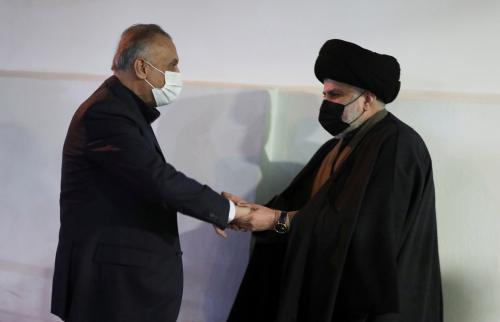

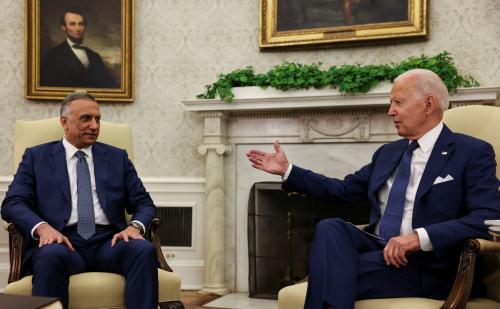

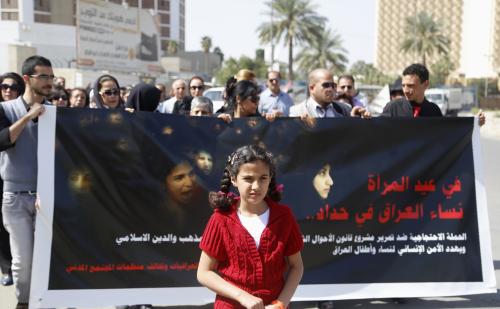
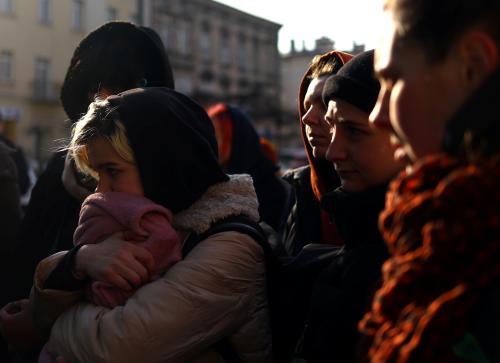
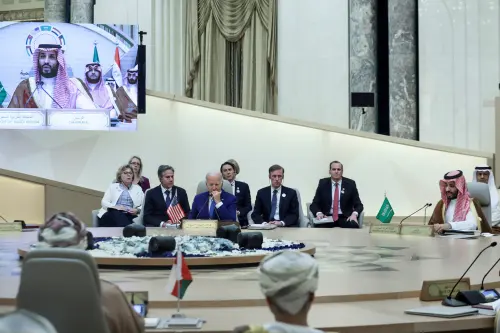
Commentary
Shiite rivalries could break Iraq’s deceptive calm in 2023
March 1, 2023